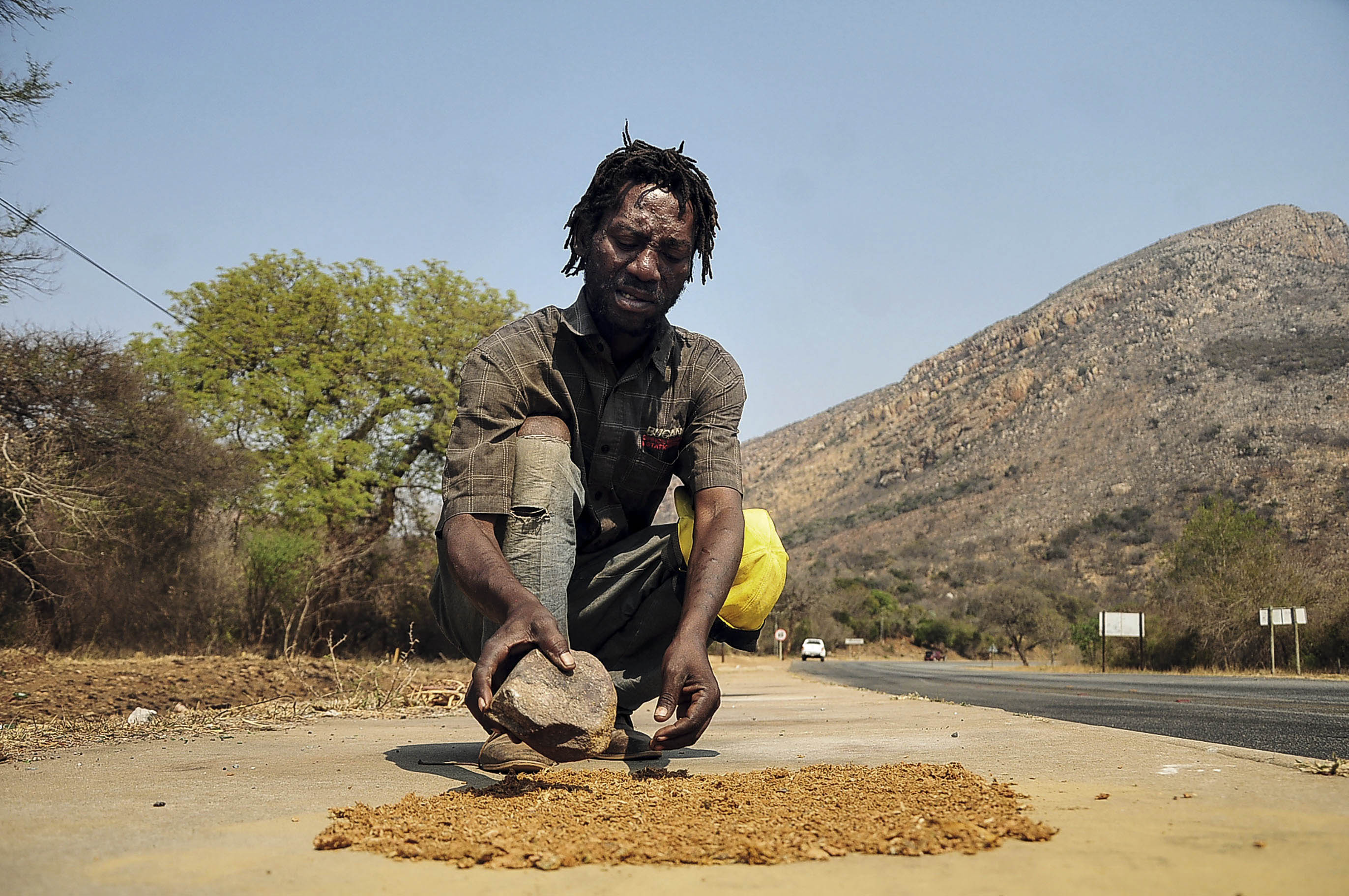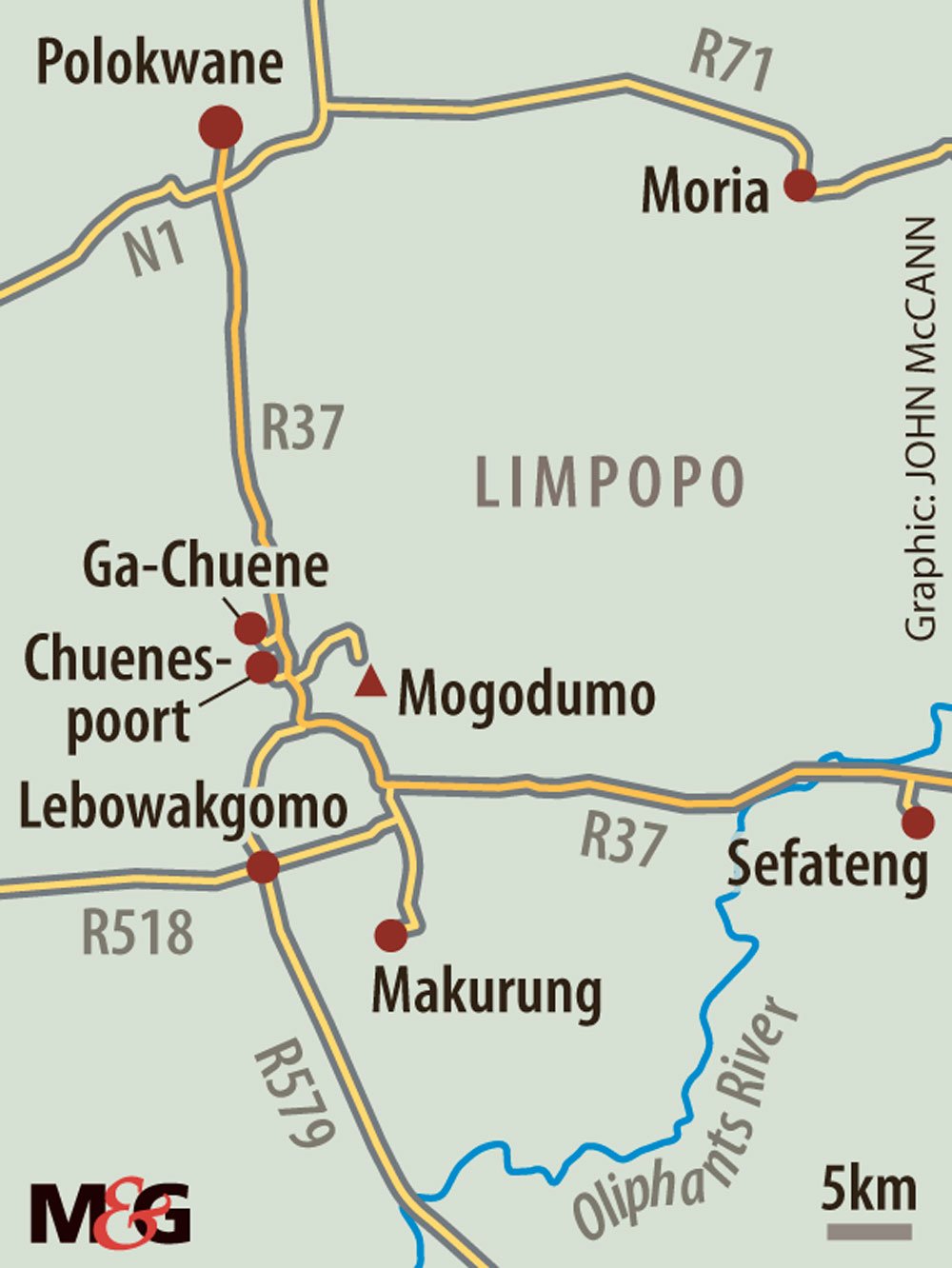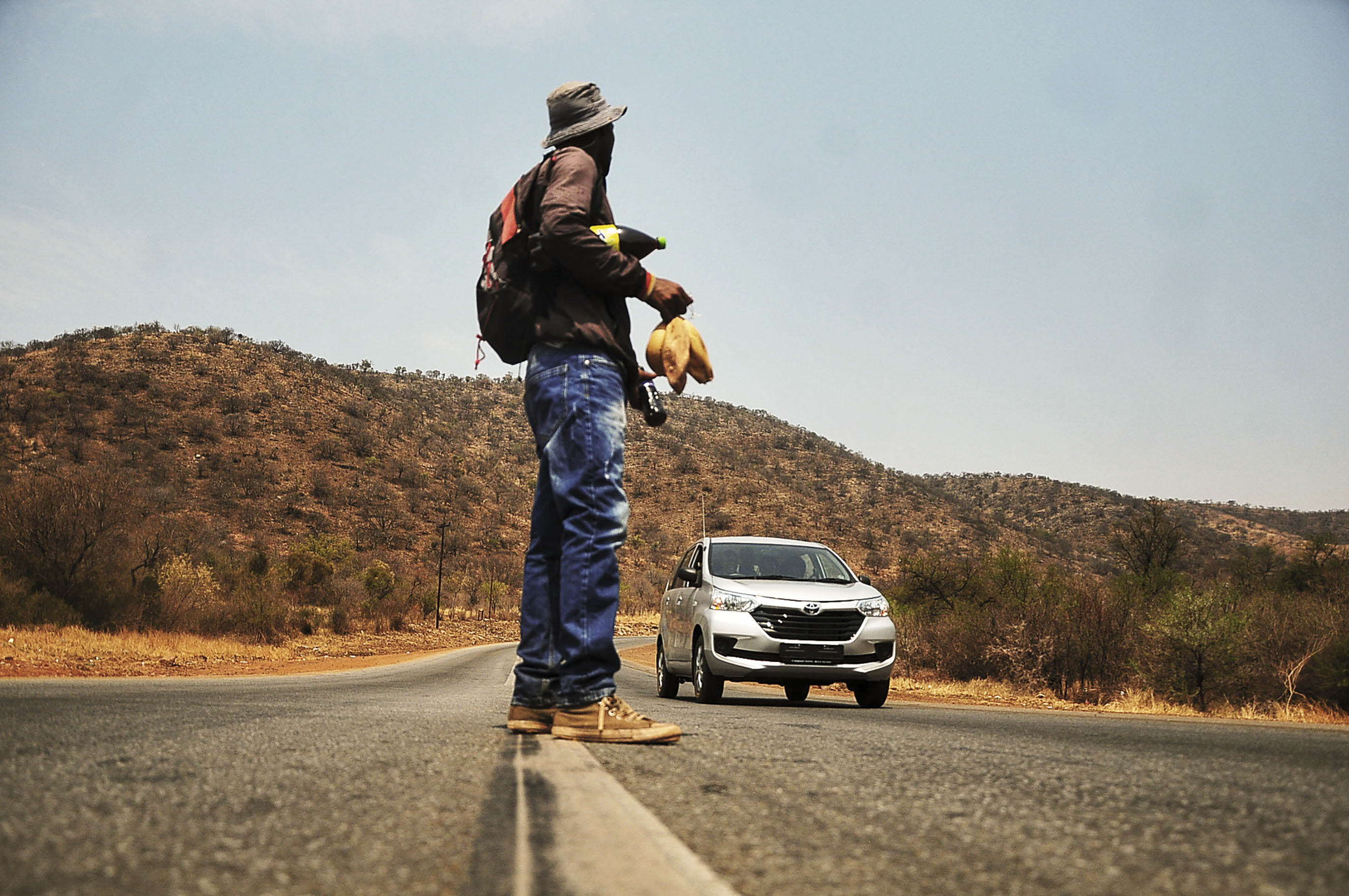(Lucas Ledwaba)
Elias Thabo Marotola was hard at work harvesting medicinal plants in a thicket at the foot of the Mogodumo mountain in Limpopo when he suddenly felt his fingers go numb.

Elias Thabo Marotola grinds herbs with a stone alongside the R37 in Chuenespoort, Limpopo. He is one of a group of men who make a living harvesting, processing and selling herbs at a busy intersection on the road. (Lucas Ledwaba)
He had been bitten by a snake. He spent a month in hospital recovering from the bite.
“I could have died if I did not act quickly,” says Marotola, 34, while resting in the shade of a cluster of trees at the intersection of the R37 and R518 roads in Sefateng near Chuenespoort.
Realising he urgently needed help, he ran towards a nearby road. By sheer luck, a motorist stopped and rushed him to the hospital in Lebowakgomo, about 12km away.
“They were giving me injections every day,” he says.
But even after he was discharged he didn’t feel as if he had fully recovered until an aunt, who is an inyanga, administered a herbal potion laced with snake venom.
“Herbs are the best healers. The hospital helped me but that herbal treatment from my aunt is what really saved me,” he says.
It is late morning on a bright Wednesday and temperatures are already soaring close to 30°C. Marotola’s colleagues constantly dashout into the sweltering sun and across the busy intersection to reach every car and truck that stops to buy muthi.
They are a group of about 20 men of different ages. The Mogodumo, which forms part of the Drakensberg range, is their chemist. The intersection is their laboratory and the roadside their counter.

Being chased and bitten by snakes and wasps, dodging speeding cars and burning in the sun or soaking in the rain are some of the hazards of the job. Theirs is back-breaking work, which includes long hikes into the mountains, carrying a pick, a machete and a bag to harvest herbs. Sometimes the terrain is so rough it takes a whole day to get to an area abundant with herbs of a certain type.
“Where have you ever seen a hospital closing? The patients would die [if we close],” says Marotola, explaining that the muthi traders are at this intersection every day, including Sundays and public holidays.
While the debate rages over land nationally, with much of the focus on commercial agricultural land, muthi traders like Marotola face a battle of their own. At the hearings into proposed changes to Section 25 of the Constitution in June, sangomas, izinyanga and muthi traders raised concerns that they are deprived of access to land to harvest medicinal plants.
Most of the land, they said, is in private hands and the owners, usually white and indifferent to the practices of traditional doctors and herbalists, are not interested in letting them harvest roots and plants.
They are also faced with strict legislation governing the harvesting and trade in medicinal plants. Last week, the department of environmental affairs held a workshop to promote compliance with the National Environmental Management: Biodiversity Act.
The department said the workshop, held in KwaZuluNatal, was aimed at muthi traders operating at the Nongoma muthi market and others in the surrounding areas after increased complaints from members of the public about the diverse number of species listed in the Threatened or Protected Species Regulations that are being illegally harvested and sold.
Marotola and his fellow traders in Chuenespoort are not aware of such developments. To them, the land is a Garden of Eden given to them by the gods, their knowledge of plants and the wisdom passed down to them by the elders who also learnt from their forebears.
Marotola says he harvests plants in a sustainable way. “How will we survive in future if we destroy these plants? How can we destroy nature, which is supposed to look after all of us?” asks Desmond Chuene, 27, who joined the trade as a teenager a decade ago.

Desmond Chuene waits in the middle of the road hoping to sell some of his herbal potions to passing motorists. (Lucas Ledwaba)
They are a truly industrious bunch, these men. With almost no resources to speak of, they have turned the intersection into a processing plant of sorts. Bulbs, the bark, roots and leaves from trees, and pieces of other plants are ground into fine powder with smooth grinding stones.
Water is collected in buckets from natural springs in the area. Wood fires are lit to boil some of the mixtures. These mixtures are poured into an assortment of containers
collected from shopping malls. Some of the finely ground powders, some of which are a blend of an assortment of medicinal plants, are packaged in small transparent plastic containers. And then the men are ready to hit the road and sell to motorists.
Their herbs, they say, are for a range of ailments including flu, high blood pressure, indigestion, urinary tract infections and headaches. Others are immune boosters.
But the most popular muthi appears to be sex potions, which sell for R40 apiece. These include a magic potion laced with baboon urine or menstrual blood collected in the caves up in the mountains.
“Women are the biggest buyers of these. Some buy for their lazy men and others for themselves,” says Marotola, who swears the potions turn lousy lovers into roaring lions.
Last year, various estimates put the South African muthi trade market at about R3-billion a year. But traders, like the men from Ga-Chuene, may never have even R5 000 in the bank. They are men who live on the margins, fighting a daily battle for survival.
Many of the traders, like Pabalelo Chuene, 27, say they were driven to the trade because they were unemployed. There are few jobs in villages like Ga-Chuene where he lives.
After matriculating, Chuene did not have the money to continue studying. He started off by selling wild fruit such as mahlatswa (Englerophytum magalismontanum) and matshidi (Ximenia caffra). He made good money. But these are seasonal fruit that are abundant in the mountains during late summer. He later joined the muthi traders. A breadwinner for his two siblings, he has since managed to pay for his driver’s licence lessons and test with the income he derives from selling muthi.
He was also schooled in the fine art and science of identifying medicinal plants by older relatives who, for many years, never found the need to consult a Western doctor for minor ailments, relying on their knowledge of plants instead.
Mpho Maribe, 26, had previously made a living as a hunter and handyman in his village of Makurung in the Ga-Mphahlele district. Hunting got him into trouble because it was on privately owned land, a factor that has put many rural residents at loggerheads with each other.
So he swapped this terrain of struggle for survival for that of the muthi trade.
“I am not stealing from anyone. With the money I make here I support six people. I think the government can help us by giving us permits to gain access to farms and harvest herbs. We are not destroying anyone’s property. All we are doing is living off nature,” he says.
Chuene says on a bad day he takes home as little as R100 but can make three times as much that on an average day. In summer the traders’ daily income grows almost threefold with the addition of wild fruit to their stock.
But with most of the tribal trust land they operate on fast being sold to individuals for business and residential purposes, it appears the muthi traders of Ga-Chuene will soon face more than the risk of snakes and wasps. Instead, they will face fences and hostile landowners.
“If they take away the land, we would die,” says Marotola. “I have never done any other work. This is my calling and a gift I learnt from my elders.
“I have raised a family with the income I made from it. I have never even been to Johannesburg and I have no desire to go there. My heart is here. All I know is here,”he says.— Mukurukuru Media